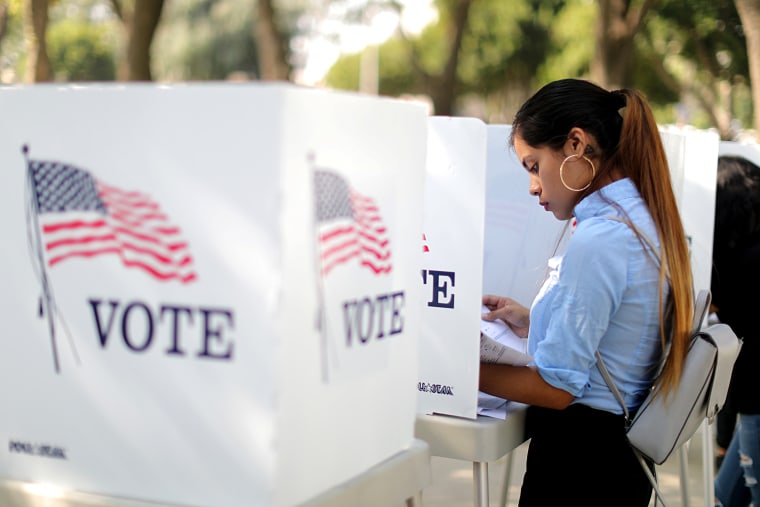A majority of Latinos say they would vote for a Democrat in several heavily Hispanic states — including the red state of Texas — and the key battleground states of Wisconsin and Michigan, according to a survey released Wednesday of 8,100 registered Latino voters.
Research commissioned by Equis Labs, a newly formed progressive group, found that more than two-thirds to almost three-quarters of Latinos in 10 of 11 states surveyed said they planned to vote Democratic.
Trump had high disapproval ratings overall in the survey and particularly on his handling of immigration and health care. He scored best on his handling of the economy, with a high of 56 percent approval in Florida and lows of 37 percent and 35 percent in Wisconsin and Colorado, respectively.
But the Equis team said his approval numbers on the economy were lower than what they are with the general population.
The research is the largest survey of Latinos so far for the 2020 elections and is intended to ratchet up outreach to Latino voters and make the effort happen sooner, Stephanie Valencia, a co-founder of Equis Labs, said. Latinos are on track be the largest non-white group eligible to vote in a presidential election, although Latinos tend to have lower turnout rates than white and African American voters.
“We believe Latinos will be the X factor,” Valencia said. Equis is the Spanish word for the letter X.
Valencia said the 2020 election will be a “game of margins” because President Donald Trump doesn’t need to win a plurality of Latino voters to win re-election, he just needs to shave enough Latino voters off the margins.
On the other hand, Democrats and progressives can’t win without “maximizing” Latino voters and support, she said.
Trump’s heaviest support among Latinos is in Florida, which is not an unknown. Cuban Americans are the larger Latino group in the state and generally older Cuban Americans in the state have tended to vote more Republican. The heavy support there is why Trump launched his “Latinos for Trump” campaign in Miami.
In Florida, about half of Latinos support a Democrat, while a third would re-elect Trump and about 14 percent would back another party candidate or are undecided, according to the Equis Labs survey.
But there is a generational component to Trump support among Cuban Americans: Among younger Cuban American voters — those 45 and younger — the majority, 53 percent, disapprove of the job that Trump is doing, the survey showed.
In Texas, where Latinos are on track to be the largest ethnic group in the Republican-controlled state, 6 in 10 Latino voters said they would vote against Trump, while less than a quarter said they would vote for him, with 18 percent undecided.
About one-third of Texas’ Latinos voted for Trump in 2016, according to exit polls. But the Equis research found his support is now at about 22 percent.
Other highlights of the research:
— About 60 percent or more of Latino voters agreed that abortions, along with other women’s health decisions, should be made privately.
— There are stark gender gaps between men and women in support for Trump. Among Michigan Latinos, women support Democrats by large margins over men. One in 3 middle-aged Latino men would vote for Trump.
— In New Mexico and Nevada, voters are split almost in half on how Trump is doing on the economy.
— In Wisconsin, Democrats have much higher support among Latinas than with Latino men.
— In North Carolina and Virginia, Trump’s support is lower than the backing that exit polls showed he had in the 2016 election.
Historically, surveys of Latino voters have been more superficial and outreach has not been done until right before the election, said Valencia, who worked on the 2008 Barack Obama campaign as a deputy Latino vote director and later in the White House under President Obama.
The research can help ferret out differences among Latino voters, from state to state, genders, age groups, whether they live in rural or urban areas and other characteristics “so we can reach everyone” and not use one blanket message, she said.
The survey found Latinos are more motivated to vote than excited about voting in 2020. Valencia said some of the gaps may be attributable to what she sees as Trump attempts to suppress Latino turnout through his hard-line immigration policies.
“I believe part of the Trump strategy with their cruel and chaotic immigration strategy is intended to subconsciously suppress voter turnout and it’s up to us to not let that happen,” she said.
The survey was done July 8-29, before the Aug. 3 domestic terror attack in El Paso, Texas, that targeted Latinos and left 22 people and dozens injured. It also took place before sweeping workplace raids in Mississippi that detained almost 700 people, mostly Latino immigrants.
Equis used five separate polling firms to conduct interviews in Arizona, California, Colorado, Florida, Michigan, North Carolina, New Mexico, Nevada, Texas and Virginia. Between 500 to 1,200 Latino registered voters were surveyed in each state.
Margins of error ranged from plus or minus 2.8 percent to plus or minus 5.2 percent. The higher margins of error occurred in Arizona and Nevada where the Latinos polled were divided into two groups and asked to respond to questions about an issue that were asked different ways for each group, a technique known as split sampling.
The survey is intended to be a tracking poll and the group plans to do its next survey in September. Some of the same questions will be asked to spot trends, but new ones will be added to gauge views on events such as the El Paso attack.
Follow NBC Latino on Facebook, Twitter and Instagram.

